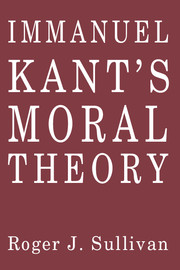Book contents
- Frontmatter
- Contents
- Preface
- Key to abbreviations and translators
- 1 Introduction
- 2 The context for Kant's moral philosophy
- Part I The nature of morality
- 3 The nature of human action
- 4 Prudence: taking care of our own interests
- 5 Morality: living autonomously
- 6 Morally obligatory ends
- 7 The defense of morality
- 8 The primacy of morality
- Part II The moral norm for persons
- Part III The norm for moral judgment
- Part IV Kant on history, politics, and religion
- Appendixes
- Notes
- Bibliography
- Index of names
- Index of subjects
3 - The nature of human action
Published online by Cambridge University Press: 05 June 2012
- Frontmatter
- Contents
- Preface
- Key to abbreviations and translators
- 1 Introduction
- 2 The context for Kant's moral philosophy
- Part I The nature of morality
- 3 The nature of human action
- 4 Prudence: taking care of our own interests
- 5 Morality: living autonomously
- 6 Morally obligatory ends
- 7 The defense of morality
- 8 The primacy of morality
- Part II The moral norm for persons
- Part III The norm for moral judgment
- Part IV Kant on history, politics, and religion
- Appendixes
- Notes
- Bibliography
- Index of names
- Index of subjects
Summary
We do not think that every kind of agent or every kind of behavior should be appraised in specifically moral language. We do not, for example, make moral judgments about chemical reactions or animal behavior. Our moral judgments, therefore, presuppose that there is something special about human beings that justifies our thinking of at least most of them as “persons” in the full sense, that is, as agents “whose actions can be imputed to” them so that they can be held responsible for what they do (M.M. 223; see Rel. 32–34/27–30). An adequate moral theory must set out an analysis of what that something is.
Within the rationalistic tradition of Western philosophy that distinctive feature of our agency has always been taken to be our ability to reason practically, that is, our ability both to deliberate about how to act and then to act on the basis of our deliberation. (See M.M 223, 227.) But not all our practical thinking is specifically moral in nature, and for this reason any analysis of moral reasoning needs to be preceded by a more general account of practical thinking. This is called a “theory of action,” and it provides the conceptual framework within which a moral theory can be developed.
So much of Kant's moral writing consists of either an analysis or a defense of our ability to reason practically that it might seem it should be an easy task to set out his more general theory of action.
- Type
- Chapter
- Information
- Immanuel Kant's Moral Theory , pp. 23 - 30Publisher: Cambridge University PressPrint publication year: 1989



